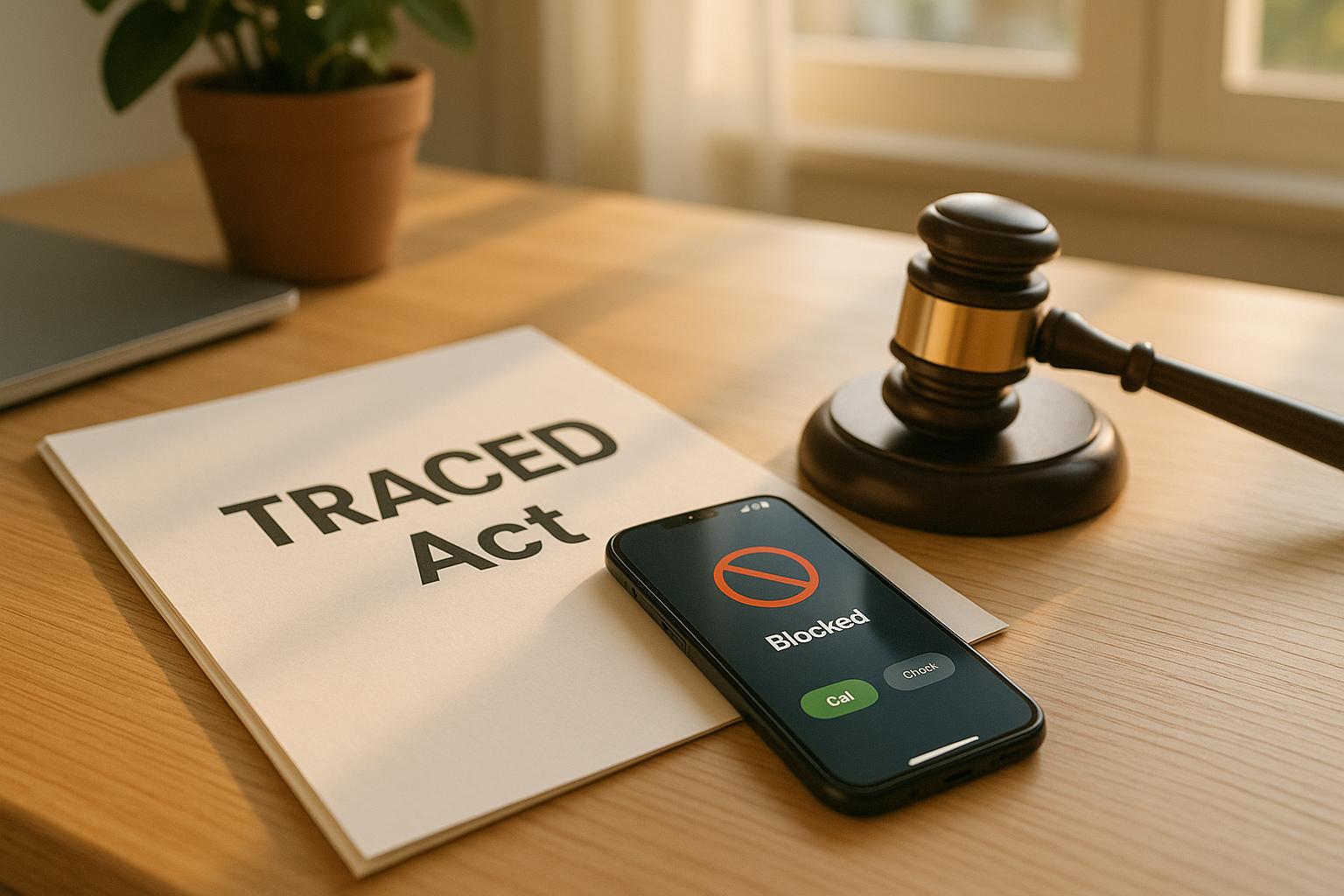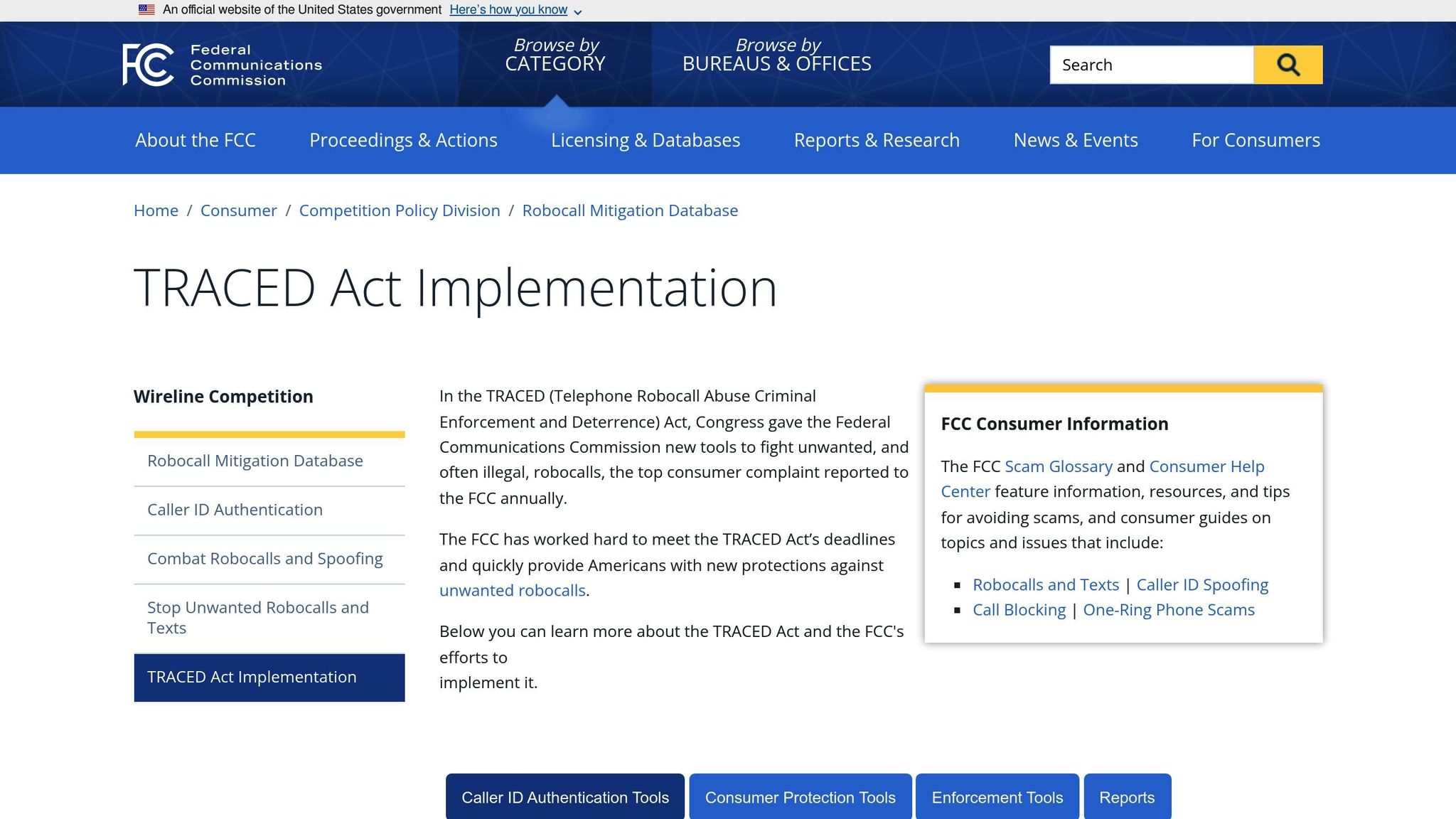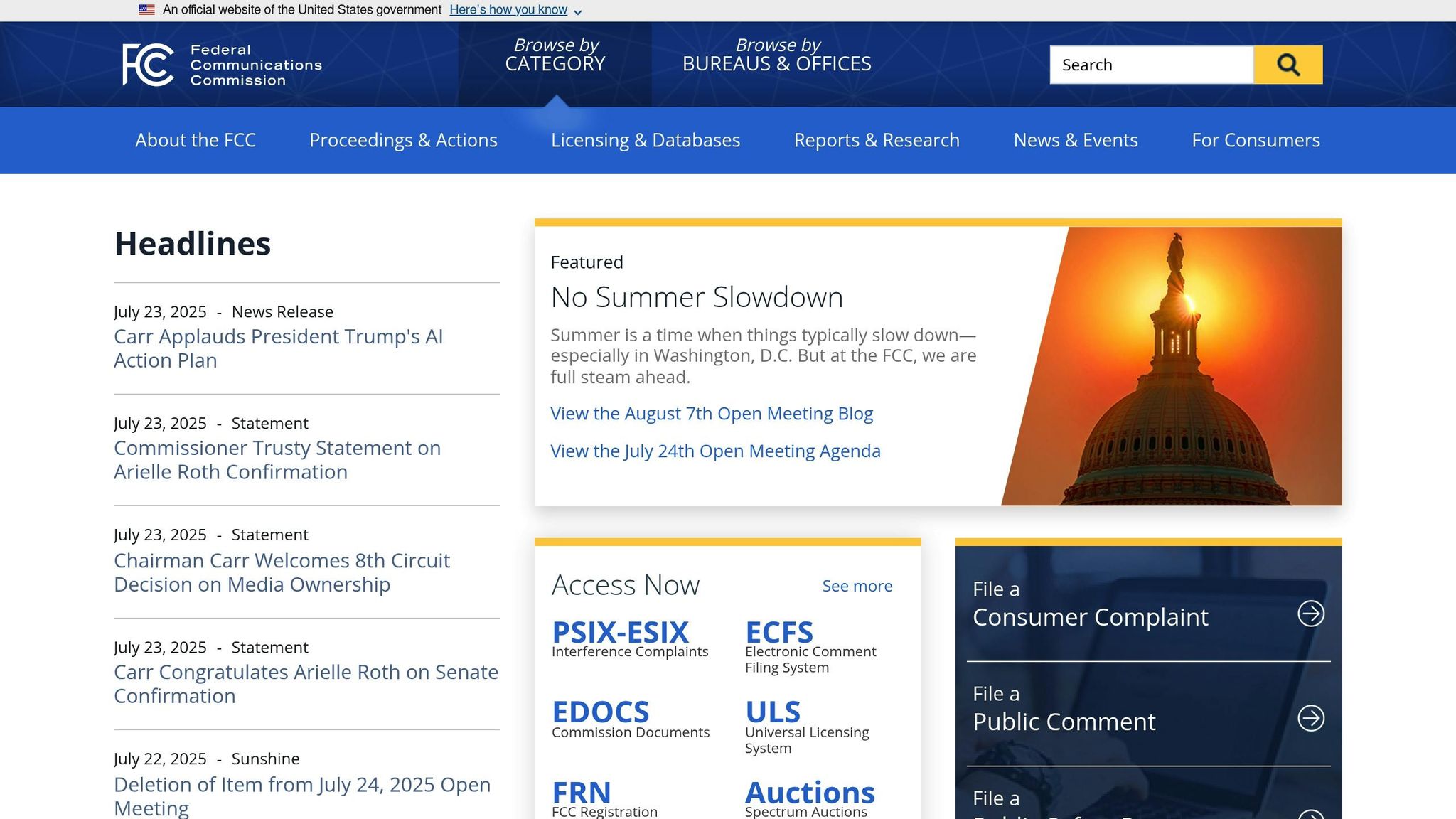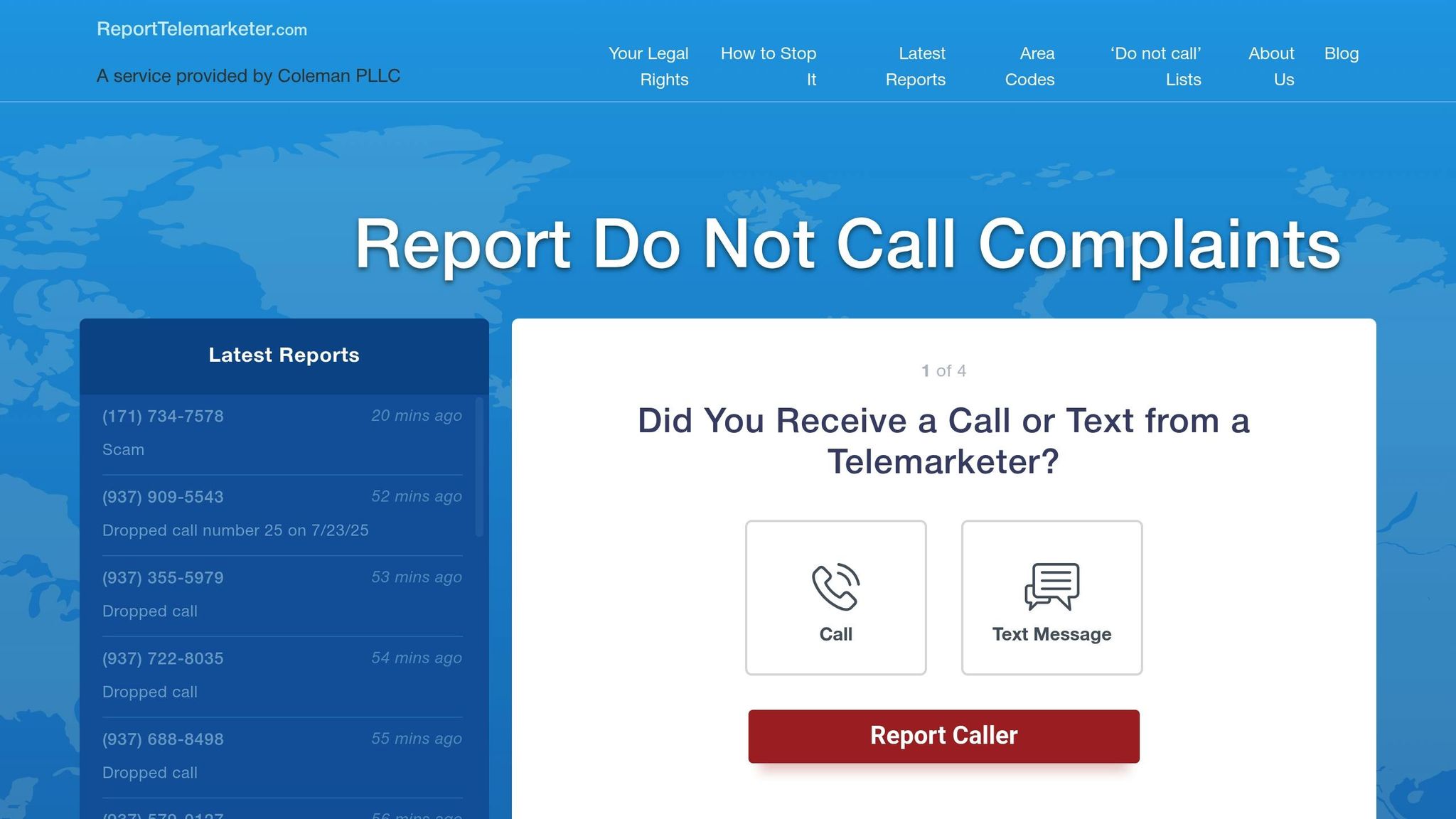
The TRACED Act has changed how the FCC enforces robocall regulations under the TCPA, giving it stronger tools to penalize offenders. Here’s what you need to know:
- Immediate Penalties: The FCC can now issue fines of up to $10,000 per intentional call without issuing prior warnings.
- Extended Timelines: The statute of limitations is now four years for intentional violations, allowing more time for investigations.
- STIR/SHAKEN Technology: Phone companies must use call authentication systems to block illegal robocalls.
- Stricter Rules: New limits on prerecorded calls and mandatory opt-out options for exemptions.
- Record Fines: Notable cases include a $225 million fine for nearly one billion robocalls.
The Act also strengthens collaboration between the FCC and DOJ, ensuring faster action against offenders. Businesses must now prioritize compliance to avoid severe financial penalties.
What are the provisions of the TRACED Act?

How the TRACED Act Expanded FCC Enforcement Powers

The TRACED Act brought major changes to how the FCC handles robocall violations. Previously, enforcement was slowed by the need to issue citations before imposing penalties. Now, the FCC has stronger tools to act quickly and decisively. Below, we’ll break down the key changes in penalty powers and enforcement timelines.
Higher Penalties for Violations
The FCC can now issue penalties of up to $10,000 per call for intentional violations without needing to issue prior warnings. This is a major shift from the old system, where violators were given a warning citation before any financial penalties could be enforced. This delay often allowed illegal activity to continue unchecked.
Here’s a quick comparison of how the penalty process has changed:
| Penalty Process | Before TRACED Act | After TRACED Act |
|---|---|---|
| Initial Action | Warning Citation Required | Immediate Penalty |
| Maximum Fine | Variable | Up to $10,000 per intentional call |
The Act also differentiates between intentional violations, where the law is knowingly broken, and non-intentional violations, which may result from technical errors or accidents.
Extended Time for Enforcement
In addition to higher penalties, the TRACED Act gives the FCC more time to pursue violators. The statute of limitations is now four years for intentional violations and one year for non-intentional violations. This extended timeline is critical for investigating complex robocall schemes, which often involve intricate networks of companies and intermediaries designed to hide the source of the calls.
On May 1, 2020, the FCC officially adopted an order to implement these extended timelines and other changes. This additional time allows for more thorough investigations and stronger cases against violators.
What This Means for Telemarketers
With these expanded powers, the FCC can impose steep penalties even for minor lapses in compliance with the Telephone Consumer Protection Act (TCPA). Higher fines and longer enforcement windows mean that violations can lead to serious financial consequences long after the initial offense.
To avoid these risks, businesses must ensure their compliance programs are airtight. This includes:
- Thoroughly vetting lead lists to confirm they meet TCPA standards.
- Obtaining updated consent from leads that don’t meet the new requirements.
- Ceasing use of non-compliant leads entirely.
Additionally, the TRACED Act requires the FCC to forward evidence of criminal robocall violations to the Department of Justice (DOJ) for potential prosecution. This raises the stakes significantly for businesses, making it more important than ever to update consent policies and compliance procedures. The financial and reputational damage from non-compliance could be devastating.
Key Rules That Affect Telemarketing Operations
The TRACED Act introduced several rules that have reshaped how telemarketing businesses operate. These changes go beyond penalties, addressing technical requirements, exemption rules, and ongoing compliance demands for telemarketers.
Call Authentication and Robocall Blocking Requirements
A major shift brought by the TRACED Act is the requirement for voice service providers to implement the STIR/SHAKEN framework. This system verifies that a call is legitimate and ensures the caller ID matches the originating number. For telemarketing businesses, this is critical – calls that aren’t authenticated risk being blocked by carriers, which could disrupt legitimate communications.
Additionally, the Act mandates that phone companies offer free robocall blocking services to consumers. It also provides a safe harbor for carriers that block calls suspected of being illegal. Transparency measures are in place to ensure that if calls are blocked in error, both callers and consumers have effective ways to address the issue.
Telemarketing businesses must ensure their calls comply with STIR/SHAKEN standards to avoid being filtered out. Enforcement actions highlight the importance of this requirement. For instance, in November 2022, the FCC removed Global UC from the Robocall Mitigation Database for failing to protect consumers from robocalls and spoofed caller IDs. These technical measures are part of a broader push to tighten TCPA exemption rules.
Changes to TCPA Exemptions
The TRACED Act has introduced stricter numerical limits and mandatory opt-out options for certain types of calls. As of July 20, 2023, new restrictions apply to artificial or prerecorded voice calls to residential lines. Here’s how the limits now look:
| Call Type | Previous Rule | New Limit |
|---|---|---|
| Non-commercial calls | No limit | 3 calls per 30-day period |
| Commercial non-telemarketing calls | No limit | 3 calls per 30-day period |
| HIPAA healthcare messages | No limit | 1 call per day, max 3 per week |
| Tax-exempt nonprofit calls | No limit | 3 calls per 30-day period |
These limits specifically target prerecorded or artificial voice calls to residential numbers. Additionally, callers using these exemptions must now include opt-out mechanisms and maintain updated do-not-call lists – even for calls that were previously exempt. This means nonprofit organizations and healthcare providers must carefully monitor their call frequency and ensure opt-out requests are honored. Legal counsel can help businesses establish compliant policies and procedures.
FCC Rule-Making and Legal Proceedings
The TRACED Act granted the FCC the authority to create and revise robocall enforcement rules, leading to ongoing regulatory updates that impact telemarketing. One significant change on the horizon is the one-to-one consent rule, set to take effect on January 27, 2025. This rule requires businesses to obtain specific consent for each type of communication, rather than relying on general consent language. Telemarketers will need to review and update their existing leads to ensure compliance.
The FCC has also streamlined enforcement efforts by forming specialized teams and launching online reporting tools. In December 2020, the FCC issued a comprehensive Report and Order to revise TCPA exemption requirements, meeting the Act’s one-year deadline. According to the FCC:
"Widespread deployment of STIR/SHAKEN will reduce the effectiveness of illegal spoofing, allow law enforcement to identify bad actors more easily, and help phone companies identify calls with illegally spoofed caller ID information before those calls reach their subscribers."
For telemarketing businesses, these developments highlight the need for constant vigilance. As the FCC continues to adapt its rules to counter evolving robocall tactics, companies must stay informed and ready to adjust their practices to meet new compliance standards.
sbb-itb-a8d93e1
Enforcement Results and Trends Since the TRACED Act
The TRACED Act has reshaped how the FCC addresses robocall violations, leading to record-breaking fines and more assertive actions against offenders.
Enforcement Patterns and Major Cases
The FCC has handed down some of the largest penalties in its history for robocall violations. For example, in June 2020, the agency proposed a staggering $225 million fine against a Texas-based health insurance telemarketing group accused of making nearly one billion spoofed robocalls in just the first quarter of 2019. Other notable cases include:
- A $120 million fine against a Florida time-share marketing operation for illegal "neighbor" spoofing.
- An $82 million fine targeting a North Carolina health insurance telemarketer.
- A $37.5 million fine against an Arizona marketer for millions of spoofed calls.
Additionally, the FCC proposed a $45 million fine under the TCPA – the largest ever under that act – against a company running an illegal robocall campaign to sell health insurance.
These enforcement efforts focus on high-volume offenders employing advanced spoofing techniques. With U.S. consumers receiving around 4 billion robocalls each month, the FCC has prioritized cracking down on the worst violators.
The FCC has also shifted its attention to robotexts. In 2024 alone (through October), the agency received over 24,000 complaints about unwanted text messages. Meanwhile, RoboKiller estimated that over 19 billion spam texts were sent in September 2024 alone. These numbers highlight the growing scope of enforcement efforts.
Greater DOJ Involvement
The TRACED Act has also strengthened interagency cooperation, particularly between the FCC and the Department of Justice (DOJ). This collaboration has significantly changed the enforcement landscape. For instance, in January 2020, the DOJ filed civil actions against two U.S.-based VoIP companies and their owners for knowingly facilitating fraudulent robocalls. These cases, investigated by a coalition involving agencies like the Social Security Administration’s Office of the Inspector General and the Treasury Inspector General for Tax Administration, resulted in federal courts issuing injunctions to block the defendants from transmitting VoIP calls to U.S. consumers. The U.S. District Court for the Eastern District of New York remarked:
probable cause to conclude that the defendants are engaged in a widespread pattern of telecommunications fraud, intended to deprive call recipients in the Eastern District of New York and elsewhere of money and property.
In another example, during the early months of the COVID-19 pandemic, the FCC and FTC sent warning letters to six gateway and originating providers carrying fraudulent robocalls related to COVID-19. These letters demanded a halt to the activity within 48 hours, and all six providers complied within the given timeframe.
The DOJ now plays a key role in supporting the FCC by filing lawsuits to collect fines and secure injunctions against repeat offenders.
Before and After TRACED Act Enforcement Comparison
| Enforcement Aspect | Before TRACED Act | After TRACED Act |
|---|---|---|
| Penalty Initiation | Required prior citation | Immediate penalty issuance |
| Maximum Penalty | Lower caps | Up to $10,000 per call for violations |
| Statute of Limitations | Shorter timeframe | Extended enforcement window |
| Largest Single Fine | Much smaller amounts | $225 million (FCC’s largest fine ever) |
| Interagency Cooperation | Limited coordination | Formal working group with DOJ and others |
| Response Time | Slower processes | Faster action, including 48-hour deadlines |
The ability to impose penalties immediately has allowed the FCC to act quickly on clear violations. The extended four-year statute of limitations has also been critical for tackling complex cases that require extensive investigation and cross-agency collaboration.
Perhaps the most impactful change is the strengthened interagency approach. While the FCC focuses on telecommunications violations, the DOJ can pursue wire fraud charges and secure injunctions to shut down operations. This combined strategy has been particularly effective in targeting gateway carriers that facilitate large-scale robocall campaigns.
Consumer Protection Tools and How to Report Violations
With the TRACED Act ramping up enforcement, consumer reports have become a key weapon in cracking down on illegal robocalls. These reports help authorities identify violators and build cases against them. Back in November 2019, nearly 54 billion robocalls were reported, showing just how widespread the issue was. This input from consumers is essential for agencies like the FCC and FTC to track down and target offenders.
The FTC compiles a detailed database of robocallers based on these reports. This database is shared with phone companies and the call-blocking industry to keep their systems up-to-date with the latest threats. By analyzing this data, the FCC and FTC can spot patterns, identify repeat offenders, and take stronger action using the TRACED Act’s tougher penalties.
Unwanted calls have a major impact on how people use their phones. 70% of Americans now avoid answering calls from unknown numbers, and 62% let most calls go straight to voicemail. This shift in behavior underscores why accurate reporting matters – it helps distinguish legitimate businesses from those abusing the system.
How Consumers Can Report Violations
Consumers have several ways to report violations under the Telephone Consumer Protection Act (TCPA). Proper documentation of these incidents is crucial for enforcement. Reports can be filed online through the FCC’s website, by phone at 1-888-CALL-FCC (1-888-225-5322), or by mail to:
Federal Communications Commission
Consumer and Governmental Affairs Bureau
Consumer Inquiries and Complaints Division
445 12th Street, S.W.
Washington, DC 20554
When reporting, it’s important to include the date, time, and phone number of each unwanted call or text. If possible, consumers should also inform the caller that they do not consent to future communications and note when this request was made.
The National Do Not Call Registry remains a key tool for reducing telemarketing calls. By adding their numbers to the registry, consumers can cut down on calls from legitimate marketers, making it easier to identify violations when unwanted calls persist. Additionally, many phone companies now offer FCC-approved robocall blocking technology that consumers can request.
While the FCC doesn’t handle private claims or provide legal advice, the reports it collects serve as the foundation for actions against violators. Under the TRACED Act, penalties can go up to $10,000 per illegal call, giving the agency the teeth to pursue offenders more aggressively.
In addition to government resources, other services are available to help consumers fight back against telemarketers.
How ReportTelemarketer.com Helps Consumers

ReportTelemarketer.com offers a direct way for consumers to address unwanted telemarketing calls and texts, connecting individual complaints to legal action. To date, the platform has assisted over 30,000 people in stopping these intrusive communications through a simple, three-step process.
The process starts when consumers submit a detailed form on the website, outlining the specifics of the telemarketing contact. The platform’s investigation team then digs deeper, using specialized tools to trace the telemarketer behind the reported number. In some cases, they may reach out to the consumer for additional details to strengthen the case.
"As a consumer protection firm, we use the telephone consumer protection laws to stop telemarketers from harassing consumers",
says the team at ReportTelemarketer.com.
If the investigation reveals that the telemarketer didn’t have the proper consent to make the call or send the text, the service takes action. This can include sending cease and desist letters or filing formal complaints against the violator.
What makes this service particularly appealing is its free model for consumers. There are no upfront costs or hidden fees. Instead, ReportTelemarketer.com recovers attorney fees directly from telemarketers after successfully stopping their illegal activities. This eliminates financial barriers, making it easier for people to seek help.
Conclusion: How the TRACED Act Strengthened Consumer Protections
With tougher penalties and advanced technical measures, the TRACED Act has reshaped the Federal Communications Commission’s (FCC) ability to combat illegal robocalls. One major change is the FCC’s authority to impose immediate penalties without issuing prior warning citations. This shift has paved the way for stronger consumer protections.
"Robocall scam operators don’t need a warning these days to know what they are doing is illegal, and this FCC has long disliked the statutory requirement to grant them mulligans. We have taken unprecedented action against spoofing violations in recent years and removing this outdated ‘warning’ requirement will help us speed up enforcement to protect consumers."
- FCC Chairman Ajit Pai
This streamlined enforcement process has already shown tangible benefits. The FCC estimates that cracking down on illegal robocalls could save consumers more than $3 billion each year in wasted time and unnecessary disruptions.
The Act combines several strategies to address the issue effectively. It extends the statute of limitations for enforcement to four years and mandates the use of STIR/SHAKEN caller authentication technology, which phone companies were required to implement by June 2021. This technology allows carriers to verify caller ID information, enabling them to block illegal calls before they reach consumers.
Additionally, platforms like ReportTelemarketer.com play a key role by allowing individuals to report illegal telemarketing activities. These reports help strengthen enforcement efforts and support the broader goals of the TRACED Act.
FAQs
What changes did the TRACED Act make to how the FCC enforces robocall violations under the TCPA?
The TRACED Act has given the FCC a much stronger hand in enforcing robocall laws under the Telephone Consumer Protection Act (TCPA). Now, the FCC can impose civil penalties of up to $10,000 per call for intentional violations – no prior warning or citation required.
With this expanded authority, the FCC can respond faster and hit violators with tougher penalties, making it clear that ignoring robocall regulations comes with serious consequences. For businesses, this means following telemarketing laws is no longer just important – it’s absolutely essential.
How does the TRACED Act affect businesses that use telemarketing?
The TRACED Act has given the FCC more power to enforce the Telephone Consumer Protection Act (TCPA), bringing in steeper penalties and tighter rules for telemarketers. Now, violations can lead to civil penalties of up to $10,000 per call, and regulators have up to four years to take action, thanks to the extended statute of limitations.
For businesses that use telemarketing, this spells greater legal risks and closer monitoring. To steer clear of hefty fines, companies may need to strengthen their compliance efforts and thoroughly evaluate their telemarketing strategies. These updates highlight the need to follow consumer protection laws carefully to avoid expensive repercussions.
How does the TRACED Act’s STIR/SHAKEN technology reduce illegal robocalls?
The STIR/SHAKEN technology, required under the TRACED Act, plays a key role in cutting down illegal robocalls. It works by verifying that the caller ID information matches the actual source of the call. This makes it much tougher for scammers to disguise themselves using fake or "spoofed" numbers.
By spotting and tagging suspicious calls, this system allows phone service providers to block fraudulent calls more efficiently, giving consumers stronger safeguards against unwanted and deceptive robocalls.